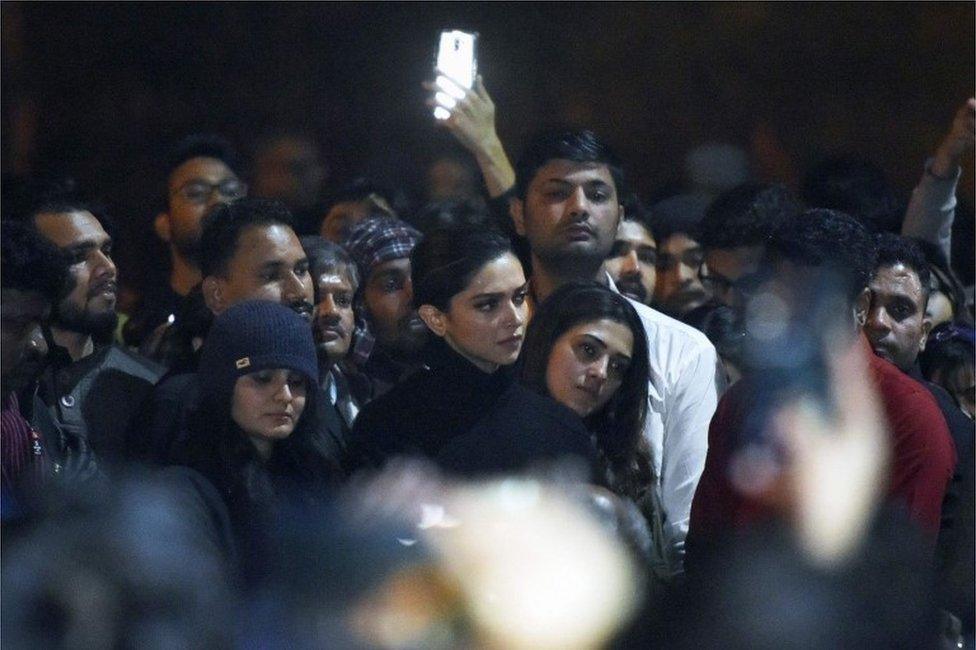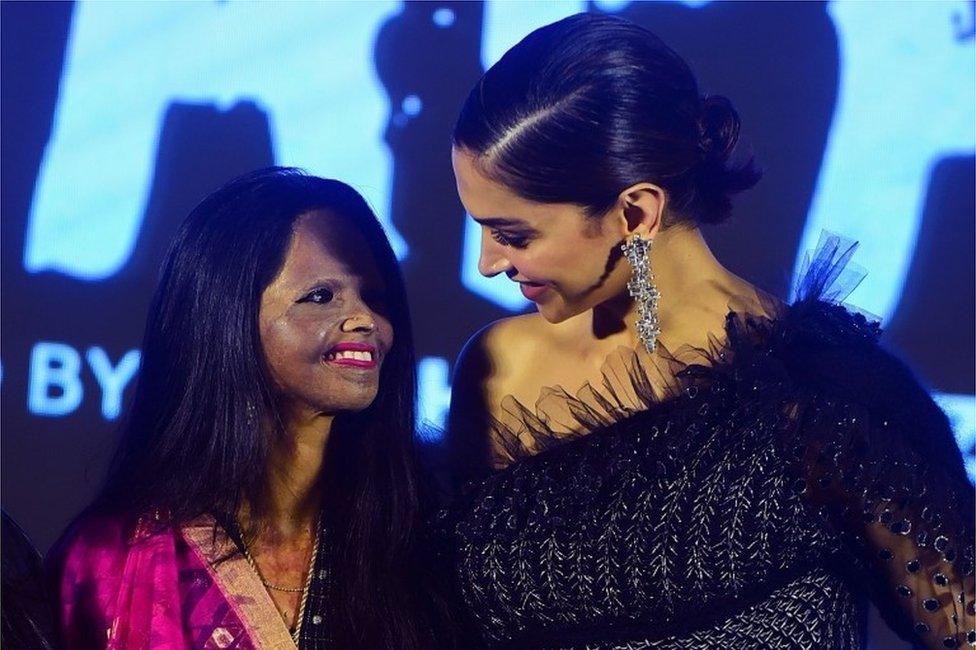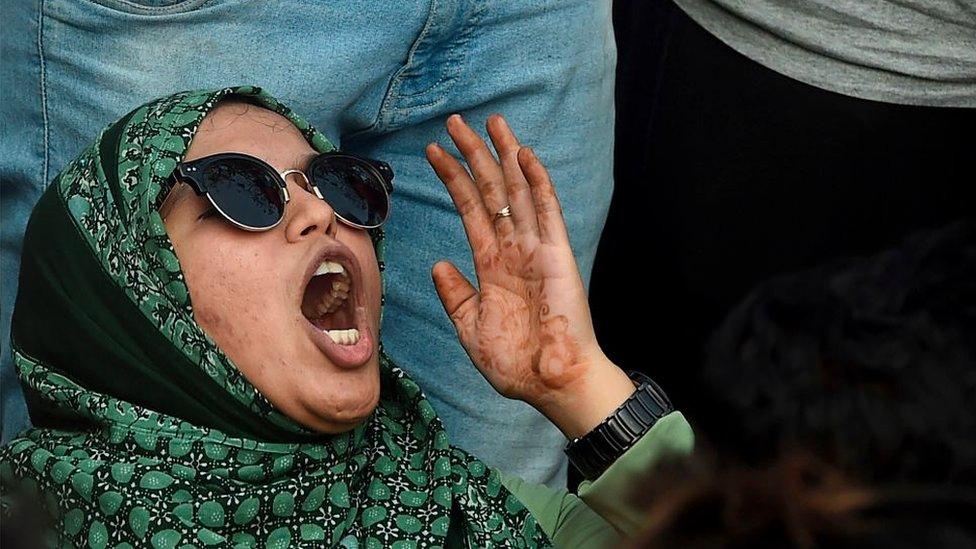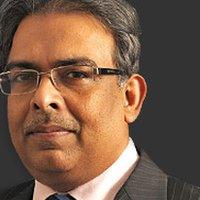Deepika Padukone: Has Bollywood found a political voice?
- Published

Padukone joined protesting students at a Delhi university on Tuesday night
On Tuesday night, a Bollywood superstar made a surprise appearance at a leading Indian university which was roiled by violence at the weekend.
On a damp winter evening, Deepika Padukone stood in solidarity with a throng of students at Delhi's Jawaharlal Nehru University (JNU), protesting against a shocking campus attack allegedly by a mob of rival students linked to Narendra Modi's ruling Bharatiya Janata Party (BJP). She made no speeches, and left as quietly as she arrived.
Within minutes, social media erupted with a frenzy that only a Bollywood star can whip up in movie-mad India.
Padukone's fans and peers and student leaders lauded her for her "brave support" for the embattled students of the university, which has long been in the crosshairs of right-wing groups supporting Mr Modi's government. Even those who usually scoff at Bollywood declared that they would watch her new film - a feature on an acid attack victim which Padukone has produced and acted in - several times.


Familiar supporters of Mr Modi's government rebuked the actress, saying she was cynically mining publicity for her new film. On Twitter, rival hashtags asking people to both support and boycott her new film began trending.
The kerfuffle over Padukone's visit to the troubled campus is understandable.
The 34-year-old actress of nearly three dozen films is truly a megastar in the world's most thriving film industry. She has an imposing social media presence - 26 million followers on Twitter and 42 million on Instagram.
In 2016, Forbes ranked her the 10th highest-paid actress in the world. The next year, she and her star husband Ranveer Singh made an estimated $21m (£16m) in combined earnings, according to the magazine. After working with her on a Hollywood film, Vin Diesel waxed eloquent, external: "Anyone could talk about how beautiful she is, and anyone could tell you about her unmatched comedic timing. But she isn't just a star. She's an actor's actor, dedicated to the craft."

Padukone has produced and acted in a film on acid attack survivor Laxmi Agarwal
Over the years, Padukone has gained a reputation as a sensitive, thinking actor. She has spoken openly about her battles with depression, external, and will travel to Davos later in January to speak about her work in trying to raise awareness about mental health. She also faced right-wing ire over her 2017 film Padmaavat, where she and Singh played the lead roles. Protesters vandalised cinemas and threatened to chop off Ms Padukone's nose, referring to a story in an Indian epic where a character has her nose chopped off as punishment.
Padukone's campus visit was a compelling image. Bollywood filmmakers and actors have often been pilloried for not speaking up. Successive governments in the past - especially led by the right-wing Shiv Sena party in Mumbai - have openly threatened filmmakers for making films they didn't like. The Bollywood filmmaker, director Mahesh Bhatt once said, is "a vulnerable animal, especially when his film inches towards release. You can blackmail and make him kneel down." Mr Modi himself has assiduously courted Bollywood and has happily posed for selfies with supportive actors and directors.
India university attack: "Students fell to the ground... they kept beating"
So is Padukone's act an inflection point of sorts? Will it encourage other Bollywood A-listers to "stand up - and stand in" as a newspaper described her campus visit? The students' protest in India against Mr Modi's government is remarkable because it is has been led by civil society and not political parties. "In a sense, Padukone had captured the spirit of the moment. This is the politics of solidarity beyond ideology. So her presence in JNU was important," sociologist Shiv Visvanathan told me.
Other are not so sure. In a sharply polarised country - pitting those who endorse Mr Modi's muscular Hindu nationalist politics against those who believe in a secular India - people who dismiss what they describe as "troublesome left-wing students" are not likely to be swayed by Padukone's visit.
"I am also not sure that people who have criticised her will stop watching her films. Our public culture is not one of consistent ideological positions. It is far more ad hoc. We are capable of holding deeply contradictory opinions. We mostly live in a threshold society rather than one which has clear distinctions between good and bad, left and right. People, for example, support both a strong state and an open economy," Sanjay Srivastava, a professor and sociologist, currently at the Institute of Economic Growth, told me.
To be sure, Padukone is not the only Bollywood heavyweight who has spoken out against Mr Modi's politics. A number of young female actors and well-known directors have attended protests against a controversial new citizenship law and the JNU campus attack. Anurag Kashyap, one of India's best-known directors, told a network last night that Mr Modi's government had "divided the country into two kinds of people - the anti-nationals and the patriots"., external
Before meeting the students at JNU, Padukone told a news network that she was "pained" by what was going on.
"It pains me because I hope this doesn't become the new normal. It's scary, and sad. This is not what our country's foundation was," she said. It is easy to be cynical about the politics of celebrities, but Padukone's remarks sounded like genuine anguish. "I think this is a very significant moment. She knows the consequences of speaking out, yet she has risked a lot of things by standing up," says film critic Shubhra Gupta. "Who knows what it will lead to? Will more stars speak out now?"
Time will tell.
Deepika Padukone plays Queen Padmavati in the film.

Read more from Soutik Biswas
- Published6 January 2020
- Published6 January 2020

